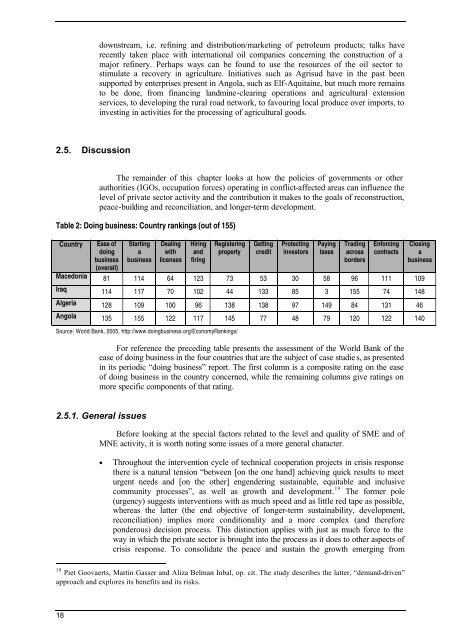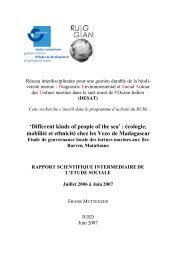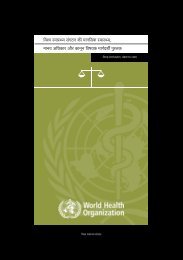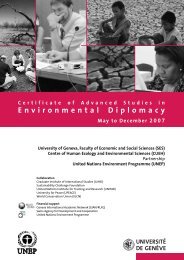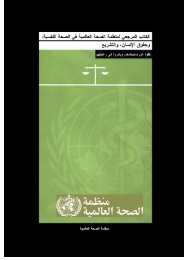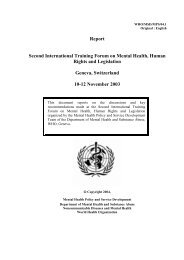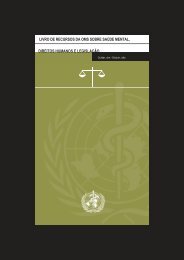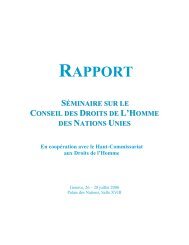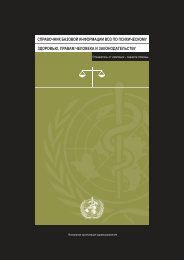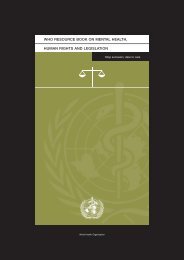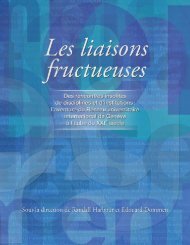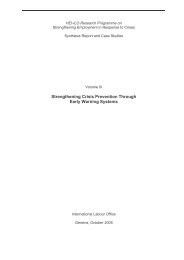Volume 1 Cedric - revised luca Final - RUIG-GIAN
Volume 1 Cedric - revised luca Final - RUIG-GIAN
Volume 1 Cedric - revised luca Final - RUIG-GIAN
You also want an ePaper? Increase the reach of your titles
YUMPU automatically turns print PDFs into web optimized ePapers that Google loves.
downstream, i.e. refining and distribution/marketing of petroleum products; talks haverecently taken place with international oil companies concerning the construction of amajor refinery. Perhaps ways can be found to use the resources of the oil sector tostimulate a recovery in agriculture. Initiatives such as Agrisud have in the past beensupported by enterprises present in Angola, such as Elf-Aquitaine, but much more remainsto be done, from financing landmine-clearing operations and agricultural extensionservices, to developing the rural road network, to favouring local produce over imports, toinvesting in activities for the processing of agricultural goods.2.5. DiscussionThe remainder of this chapter looks at how the policies of governments or otherauthorities (IGOs, occupation forces) operating in conflict-affected areas can influence thelevel of private sector activity and the contribution it makes to the goals of reconstruction,peace-building and reconciliation, and longer-term development.Table 2: Doing business: Country rankings (out of 155)CountryEase ofdoingbusiness(overall)StartingabusinessDealingwithlicensesHiringandfiringRegisteringpropertyGettingcreditProtectinginvestorsPayingtaxesTradingacrossbordersEnforcingcontractsClosingabusinessMacedonia 81 114 64 123 73 53 30 58 96 111 109Iraq 114 117 70 102 44 133 85 3 155 74 148Algeria 128 109 100 96 138 138 97 149 84 131 46Angola 135 155 122 117 145 77 48 79 120 122 140Source: World Bank, 2005, http://www.doingbusiness.org/EconomyRankings/For reference the preceding table presents the assessment of the World Bank of theease of doing business in the four countries that are the subject of case studie s, as presentedin its periodic “doing business” report. The first column is a composite rating on the easeof doing business in the country concerned, while the remaining columns give ratings onmore specific components of that rating.2.5.1. General issuesBefore looking at the special factors related to the level and quality of SME and ofMNE activity, it is worth noting some issues of a more general character.• Throughout the intervention cycle of technical cooperation projects in crisis responsethere is a natural tension “between [on the one hand] achieving quick results to meeturgent needs and [on the other] engendering sustainable, equitable and inclusivecommunity processes”, as well as growth and development. 19 The former pole(urgency) suggests interventions with as much speed and as little red tape as possible,whereas the latter (the end objective of longer-term sustainability, development,reconciliation) implies more conditionality and a more complex (and thereforeponderous) decision process. This distinction applies with just as much force to theway in which the private sector is brought into the process as it does to other aspects ofcrisis response. To consolidate the peace and sustain the growth emerging from19 Piet Goovaerts, Martin Gasser and Aliza Belman Inbal, op. cit. The study describes the latter, “demand-driven”approach and explores its benefits and its risks.18


